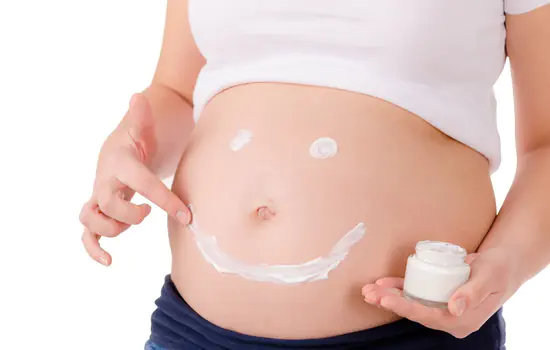Dry skin during pregnancy is a common, although not entirely pleasant, phenomenon. It is a feeling of tightness and irritation, in which the skin peels off, becomes covered with small scales and becomes dull. This type of tone causes discomfort, redness and itching. Dryness is a violation of fat and water metabolism, acid-base balance, as well as malfunctions of the sweat and sebaceous glands. If your tone is very dry, cracks appear through which germs and bacteria can get in, which can cause inflammation and acne. Such skin occurs in older people (this is a natural phenomenon during the aging process), in people with hereditary dry skin tone, in certain diseases and in women during pregnancy. In this article we will learn why dry skin occurs during pregnancy and how to deal with it.

Dry skin in pregnant women - what is the reason for metamorphosis?
During pregnancy, significant changes occur in a woman’s body, namely hormonal fluctuations. The level of the female sex hormone, estrogen, increases, which can suppress the production of sebum and reduce its secretion. After all, complex treatment of acne includes oral contraceptives containing estrogens. Thus, less sebum is secreted on the surface of the epidermis.
The influence of another hormone, progesterone, which is very important for expectant mothers, can reduce the elasticity of the skin, making it thin and sensitive. All this contributes to dryness and flaking of the epidermis. However, the effect of progesterone can be called a double-edged sword: on the one hand, it is dryness, and on the other, it has the opposite effect, increasing the activity of the sebaceous glands and, as a result, the development of acne.
So, those who had oily skin before pregnancy will be in for a pleasant surprise. It will become normal, oily shine, blackheads and pimples will disappear. Caring for it will change radically; there will be no need to constantly powder it, use antiseptics, or apply scrubs and peels. This is the positive side of the effect of estrogen on the skin.
It will be more difficult for those with dry and normal skin during pregnancy, since these types are characterized by normal or weak sebum production. As a result, the skin will become drier, problematic and sensitive, leading to itching, flaking and allergic reactions.
Not only the skin, but also hair and nails undergo changes. All these symptoms, together with others, may indicate the occurrence of thyroid diseases, namely hypothyroidism (decreased synthesis of thyroid hormones). In this case, you need to consult an endocrinologist and correct this condition.
Also, vitamin deficiency during pregnancy can lead to dry skin. The lack of vitamins A and E has a particularly deplorable effect, which leads to irritation, peeling and dry skin.
To solve these problems, it is best to contact specialists. They will prescribe treatment to eliminate the problems described above, correct the activity of the sebaceous glands, and prescribe treatment for dry or oily skin that is prone to acne. However, it should be remembered that expecting a child is a crucial period when you should not self-medicate and prescribe medications yourself.
Does dry skin affect the fetus?
Let's say right away that it has absolutely no effect. You need to worry when dryness is a consequence of a certain pathology. And if there are no dangerous symptoms, then there is no need to worry. Very often, these types of symptoms signal the presence of an allergic reaction to certain foods and household chemicals. The only danger is that intolerance to certain substances can be transmitted intrauterinely to the fetus.

However, dry skin does not in any way affect the development and growth of the fetus.
Only the expectant mother experiences unpleasant sensations and discomfort, since dry skin can lead to other unpleasant consequences:
- the appearance of stretch marks in certain areas of the body;
- itching;
- peeling of the epidermis;
- brittleness and dryness of hair;
- dandruff;
- the occurrence of microcracks.
All these unpleasant sensations should be eliminated by a set of special measures that will primarily eliminate the cause of dryness. External local exposure is also necessary, so moisturizing and nourishing the skin are mandatory procedures in the fight against dehydration.
What is your skin type?
It should be clarified that every person is born with a certain type of tone, which is determined by his genetics. However, as a result of hormonal changes in women, certain diseases and age-related decline, the type of tone may change. So, while expecting a child, a woman’s skin becomes drier, regardless of heredity and genetics. Therefore, it is very important to find out what type of skin you currently have. How to do it?
To determine your tone type, you need to wash your face with soap (for diagnostic purposes only, in other cases this action is unacceptable). Leave your face like this for an hour without applying any cosmetics to it. After an hour, pay attention to the condition of the epidermis; if there is a feeling of tightness, peeling in some areas, hidden pores, then this type of tone is dry.

Oily skin is manifested by large pores with comedones (blackheads), oily sheen, and acne on the face.
A normal tone is considered close to the ideal type. Such skin does not cause trouble to its owner. After washing with soap, he feels good, there is no tightness, irritation or flaking. Only a slight shine may appear in the T-zone (chin, nose, forehead). Also in this area you can notice the presence of several comedones.
If this test does not give accurate results, then you can apply a rich cream to your face. If the tone type is dry, then the cream will be instantly absorbed without leaving an oily sheen on the face. If you apply a greasy cream to a greasy tone, you will experience some discomfort in the form of a heavy oil film on your face. A normal type of tone will react differently: on dry areas the cream will be absorbed well, but on oily areas it will remain.
Whatever changes occur to your skin during pregnancy, you will have to adapt to them.
How to care for your skin during pregnancy
First of all, you will have to change the care itself and the arsenal of cosmetics. You will have to select skincare procedures and cosmetics depending on the new condition of the skin. You can choose cosmetics from a certain line, but it is desirable that such cosmetics contain natural ingredients (in this case, the risk of developing an allergic reaction will be minimal). The presence of vitamins in a cosmetic product is also important. They will help make the skin smooth, soft and velvety, eliminate dryness, flaking and redness. The cosmetic composition must include hyaluronic acid and seaweed extract. They will perfectly moisturize the skin and saturate it with moisture. Thermal water will have a good moisturizing and soothing effect; it is a necessary care product for sensitive and problematic skin.
Daily skin care during pregnancy includes three stages:
- The first stage is cleansing the skin.
- The second stage is toning.
- The third stage is hydration and nutrition.
Cleansing

Dry skin during pregnancy requires special care. Care should be delicate and gentle so as not to injure already dry skin. Gentle milk, micellar water and foam based on thermal water are used as cleansers.
Toning
A mandatory stage of the skincare procedure. The toner is designed to eliminate residues of cleansers. It also prepares the skin for subsequent stages of care. The tonic can be prepared on the basis of thermal water and include a decoction of medicinal plants.
Applying a moisturizer and nourisher
You need to moisturize and nourish the skin twice a day (if your skin is very dry, you can do it three times). Currently, all creams contain sunscreen filters. However, this is not always enough, so you also need to use sunscreens with a high protection factor. It should be remembered that excess ultraviolet radiation greatly dries the skin and damages its structure. It is important to take care of your skin during the night, so you need to cleanse and nourish it in the evening. After all, it is at night that increased regeneration of epidermal cells occurs.
Don't forget about dry eyelids during pregnancy. In this area, the skin is very sensitive, thin and delicate. Therefore, the use of eye cream is mandatory. Lips also suffer from dryness; they can also peel and crack. To eliminate unpleasant symptoms, you can massage your lips. It is carried out with a toothbrush using light circular movements. After the massage, you need to apply nutrients or moisturizers to your lips. For example, honey, olive oil, sour cream or cream.
Additional skin care includes the use of scrubs and peels. Scrubs should contain small abrasive particles and not injure the epidermis. They are carried out 1-2 times a week. You can also prepare scrubs at home from natural products and oils.
When choosing scrubs and cosmetics, you need to carefully study the label for the presence of essential oils. They are strong allergens and can cause an allergic reaction.
While expecting a child, it is better to avoid salon procedures. If suddenly for some reason they are necessary, then the cosmetologist should be warned about your condition.
In addition to skincare procedures, do not forget about a healthy lifestyle, which is the key to youth and beauty.

Prevention of dry skin is also important. To do this, the following measures are taken:
- compliance with the drinking regime, you need to drink about 2 liters of clean water per day;
- balanced and proper nutrition;
- adherence to sleep and rest patterns;
- categorically do not use soap (even baby soap) when washing your face;
- wash with slightly warm water (hot and warm water dries out the skin);
- use a special delicate foam for washing;
- regularly moisturize the skin, use moisturizing masks;
- use sunscreen;
- regularly scrub your face to eliminate flaking;
- When using household chemicals, wear protective rubber gloves;
- in winter, control the level of humidity in the room (radiators and air conditioners greatly dry the air, which negatively affects the skin);
- use olive, sesame or sunflower oil as body moisturizers.
How to eliminate dryness with masks
Using natural ingredients, you can prepare moisturizing and nourishing masks at home. Before preparing and applying masks to your face, you should make sure there is no allergic reaction. So, the most effective are the following masks:

Vitamin
To prepare a moisturizing mixture, you need to purchase ampoules with vitamins A and E at the pharmacy. These fat-soluble vitamins perfectly nourish and moisturize, and are also the basis for any masks. The mixture is prepared as follows: 2 tablespoons of crushed oatmeal are mixed with 1 tablespoon of olive oil and 2-3 drops of vitamin A and E are added. The mixture is thoroughly mixed and applied to the face for 15 minutes, then washed off with water at room temperature.
Egg yolk and oatmeal
Cook oat milk porridge. Take two tablespoons of porridge, add 1 tablespoon avocado oil, then add 1 egg yolk. Mix everything and apply to face. Leave for 20 minutes, then rinse with water.
Pear puree
Mash the pear together with the peel, add 1 tablespoon of olive oil and 1 tablespoon of natural yogurt. The mixture is applied to a clean face in a thick layer for 20 minutes, then washed off with water at room temperature.
Cottage cheese and parsley juice
Take 2 tablespoons of natural cottage cheese, add 1 teaspoon of fresh parsley juice, 2 teaspoons of flaxseed oil, half a teaspoon of fish oil and half a lemon zest. Mix everything and apply to face for 15 minutes. The mask is washed off with a cold decoction of parsley, then a nourishing cream is applied to the face.
Honey and yogurt
Take 1 tablespoon of natural honey and 1 tablespoon of natural yogurt. All ingredients are thoroughly mixed and applied to dry areas of the face or the entire face. The mixture is left on the face for 15-20 minutes, then washed off with cool water.
If the dryness is severe and nothing helps, then you must urgently consult a doctor to identify the true cause of the phenomenon.
Pregnancy is always accompanied by a number of changes in the body of every woman. Organs and tissues undergo enormous stress, which sometimes lead to not very good changes.
One of the most common such problems among expectant mothers is dry skin during pregnancy, which is typical even for those who have never experienced dry skin before. The most important and worrying question is: is this dangerous for mother and baby?
Causes
In order to know how to help your skin, you need to understand what the main causes of dryness are. There are several of them. During pregnancy, they tend to occur simultaneously, and many of them are a normal and integral phenomenon of this period, due to nature, which leads to difficulties in the fight against the disease.
Among the main “culprits” it should be noted:
- changes in hormonal levels;
- insufficient fluid intake;
- dysfunction of the thyroid gland;
- unbalanced diet.
The first thing that happens after conception is a change in the woman’s hormonal balance so that her body does not reject the embryo.
Endocrine system:
- quickly increases the level of progesterone, the pregnancy hormone,
- which under its influence makes the skin thin, sensitive and less elastic,
- later, the production of the main female sex hormone, estrogen, increases, which further reduces the secretion of fat by the sebaceous glands to moisturize and nourish the skin.
- It is impossible to avoid and bypass these changes in the body.
The next main point of pregnancy is the increased need for water.
It is especially needed in the first trimester, since during this period a number of changes occur, which are determined by the need for additional fluid.
This includes:
- increase in total blood volume;
- formation of amniotic fluid;
- uterine growth;
- formation of new organs and tissues of the fetus.
A woman’s body begins to work for two, so any existing lack of moisture will be compensated primarily from the skin cells of the expectant mother.
In the absence of its timely and sufficient replenishment, the skin quickly becomes dry and flaky, losing its firmness and elasticity.
The period of bearing a child is characterized by malfunctions and disturbances in the functioning of the thyroid gland. This manifests itself primarily due to the lack and excess of certain hormones produced by it. Accompanied by the development of a disease such as hypothyroidism, which is characterized by fragility and dryness of the skin, hair and nails.
Why should you tell your doctor about this?
A doctor who is registering a pregnant woman should be aware of any of her concerns and exciting changes. It’s also worth talking about dry skin.
This is necessary so that, together with the doctor, the main causes and safe methods of treating the disease are established.
In addition, dry skin can be a symptom of the development of some disease, which in turn can negatively affect the baby. There is often itching and flaking of the epidermis, which may indicate an allergic reaction, which can sometimes be transmitted to the child in utero.
Only a doctor can find out the exact cause and make a specific conclusion. To do this he:
- examine the general condition of the skin,
- will check if there are certain areas of dryness,
- will listen to complaints,
- and will also prescribe the necessary tests, but usually a pregnant woman undergoes a large number of them, so a lot can be understood from blood biochemistry.
Thus, having determined and understood why this change in the skin is observed, appropriate comprehensive treatment is prescribed. Most often, it consists of taking a group of vitamins, using moisturizing cosmetics and maintaining a proper diet.
Effect on the fetus
In such cases, you need to worry only when dry skin is a symptom and consequence of the development of some disease or disorder in the woman’s body.
Most often this is an allergic reaction to certain types of substances and products.
Here the danger lies precisely in the fact that such individual intolerance or a specific disease (if it occurs) can be transmitted in utero to the baby.
Here only the expectant mother suffers, and sometimes such an illness leads to a number of moments that are very undesirable for a woman.
The main ones are:
- the formation of stretch marks (usually on the chest, abdomen, thighs);
- itching;
- peeling;
- the appearance of dandruff on the head;
- tendency to form microcracks.
All this necessitates the need to take comprehensive measures aimed at both eliminating the main cause of dryness and the impact at the local level - nutrition and hydration.
What to do for dry skin during pregnancy
The most important thing is to understand why such a change occurs in the skin, and based on this, build a suitable scheme for care and restoration.
The first thing you need is to provide your body with a sufficient amount of fluid, or rather clean water.
After all, the entire stage of pregnancy is based on the intrauterine creation, growth and development of another person (consisting of 80% water), with its own functioning systems.
At the cellular level, water determines vital processes and exchanges that occur in both mother and child. If there is a shortage of it, a woman will immediately notice it, primarily with dry skin and general malaise.
It is necessary to adhere to a competent approach to drinking during certain periods of pregnancy.
This fact requires attention due to certain changes and stresses on the female body, as well as the successive stages of fetal development. Your doctor will undoubtedly be involved in this issue, who will explain in detail when and how much water you need to drink.
For your information. In the first months of pregnancy, it is recommended to drink at least 2 liters of clean water, not including tea, soups and other similar products. But to avoid swelling, after about the 30th week, you need to drink less water, especially at night, on average it’s about 1 liter.
Undoubtedly, the diet should be normalized. After all, our overall health, and in this case, the proper development of the baby, depends on what we eat.
Food greatly affects the condition of human skin. They are the main and natural source of all the necessary vitamins, minerals and nutrients that are involved in vital processes.
Naturally, the mother's body needs constant additional nutrition. Therefore, you need to not just eat for two and everything in a row (this is the path to inevitable and unnecessary extra pounds), but give preference to healthy and wholesome food, most of which are vegetables, fruits and animal protein.
We must not forget that a certain and constant diet is not unimportant. There should be main meal times, although it is difficult for pregnant women to adhere to this, you need to try.
Disorderly and unportioned eating, and especially with heavy snacks, negatively affect the general condition and well-being.
Everything that happens at the hormonal level can be compensated by proper skin and body care. It consists of appropriate cleansing, toning and nutrition.
Various masks are used for nutrition and toning, which can easily be prepared at home. Moisturizing with creams, oils and lotions is also required.
To do this, it is not necessary to look for and purchase expensive products for pregnant women - it can be a nourishing baby cream or oils of natural origin (olive, sea buckthorn, etc.) that are accessible to everyone.
Particular attention is paid to the most problematic areas (most often these are the hands, stomach, knees, elbows).
If the problem is in your hands
Dry skin on the hands appears more often and earlier during pregnancy than on other parts of the body.
This is due to the fact that the hands are constantly exposed to various substances that do not allow the formation of a dense and protective layer of the outer epithelium.
As a result, the skin of the hands becomes dry and dull. The palms of pregnant women often peel, and there is a constant feeling of tightness. Small and numerous wrinkles and sometimes microcracks appear.
This whole situation can be corrected by eliminating hand contact with chemical detergents and cleaners. All such home cleaning manipulations should be carried out strictly with rubber gloves.
Wash your hands only with liquid cream soap, then apply moisturizer or oil. Periodically apply nourishing and soothing masks.
In the cold season, before going outside, be sure to apply nourishing cream and put on mittens.
Folk recipes
Since ancient times, there have been a number of folk recipes for caring for dry skin that have been passed down from generation to generation.
Among them are:
- taking baths with essential and vegetable oils (olive, peach, sea buckthorn), glycerin, milk, honey, decoctions of flax seeds and oats;
- nourishing masks based on honey;
- rubbing linseed and sunflower oil into especially problem areas;
- use for moisturizing animal fats (butter, fat);
- washing with milk;
- facial compresses made from a decoction of medicinal herbs (calendula, chamomile, mint).
Rough feet, knees, elbows and hands can be perfectly softened and moisturized by nightly nourishing treatments, when a rich cream or oil is applied to these areas, wrapped in polyethylene, and on top with warm (preferably woolen) material and all this is left until the morning.
To avoid the appearance of stretch marks and minimize them, you need to have elastic and moisturized skin. To do this, it is recommended to rub nourishing oils (sunflower, flaxseed, sea buckthorn) into the abdomen, chest and thighs every day.



